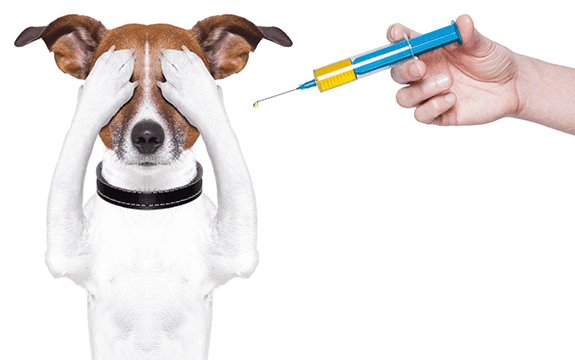It appears that annual vaccinations for dogs are on the rise, despite the risks involved. According to researchers, one round of core vaccines given to puppies at around 16 weeks should cover them for several years, meaning they don’t need to be vaccinated annually. The same applies to cats. People in the global pet care industry, including veterinarians and pet groomers, have noticed, and spoken out against a tendency that has become prevalent – over-vaccination. Here are the facts:
Vaccines Guidelines
Vaccination standards have been set by the American Animal Hospital Association (AAHA) and other global organizations as guidelines for veterinarians and breeders. These inform them at which point in an animal’s life the vaccines are to be given and at what intervals. They also lay out the standards of the core vaccines for cats and dogs.
Each state has a list of mandated vaccine requirements. Rabies is one of those vaccinations because as a potentially fatal zoonotic disease, it transmits to humans from animals.
Core Vaccinations for Pets
The core vaccines administered to pets offer immunity from dangerous diseases widely found across the US that can cause illness or death. The recommended immunizations (core vaccines) for pets are as follows:
For dogs:
- canine parvovirus (CPV)
- canine distemper virus (CDV)
- canine adenovirus (CAV)
- rabies
For cats:
- feline herpesvirus type 1 (FHV-1)
- feline calicivirus (FCV)
- feline panleukopenia virus (FPV)
- rabies
Non-Core Pet Vaccines
These non-core vaccinations are considered optional and veterinarians should only suggest them if a pet is in danger of exposure to the infectious organism. This is based on the pet’s lifestyle and the geographic distribution of the disease. Non-core vaccines include:
For dogs:
- canine parainfluenza virus (CPiV)
- canine influenza virus (CIV)
- Bordetella bronchiseptica (prevents “kennel cough”)
- Leptospira spp. (protects against Leptospirosis)
- Borrelia burgdorferi (for Lyme disease)
- Crotalus Atrox Toxoid (also called the CAT, or rattlesnake vaccine)
For cats:
- feline leukemia virus (FeLV)
- feline immunodeficiency virus (FIV)
- virulent feline coronavirus (or the FCV, prevents feline infectious periodontitis or FIP)
- Chlamydia felis
- Bordetella bronchiseptica (against kennel cough)
Which Pets Should Keep Vaccines Up to Date?
In his article for PetMD, Can You Over-Vaccinate Your Pet? Patrick Mahaney, VMD, CVA, CVJ, discusses the fallacy of keeping pet vaccinations ‘up to date.’ He maintains that many pet owners do this out of fear of their pets falling ill.
The only times, according to him, that these fears can be real are for pets with a greater risk for exposure to these diseases. When a pet frequents facilities where it encounters other pets, like boarding facilities, parks, or pet care, then it should be vaccinated. The same applies to a pet adopted from a pet shelter.
While so much emphasis is sometimes placed on preventing some illnesses with vaccinations, Mr. Mahaney points out that not enough effort is placed to diagnose and resolve existing ailments. These ailments (including obesity and periodontal disease) are more harmful to the immune system and general health of pets, affecting their life quality. No vaccine can correct these problems.
Pets receive no benefits from annual re-vaccinations according to experts as the core vaccines offer immunity for between 5 and 15 years. Besides the fact that the pet receives no benefits, over-vaccination may be harmful.
Over-Vaccination Risks
In his 2003 research on immune function, Dr. Yubraj Sharma identified several dysfunctions caused to pets by over-vaccination.
- Over-Vaccination may cause low immune resistance and recurring infections to other pathogens, causing chronic and recurrent infections. Frequent doses mean that a pet’s immune system never rests because it is forced to manufacture antibodies to several pathogens at the same time. Their immunity is lowered since they cannot fight other infections, and this may lead to unnecessary antibiotic use. Additionally, it is almost impossible for a dog or cat to become infected with any of the various diseases they are vaccinated for at the same time. Yet, their bodies must fight the pathogens by producing antibodies for them simultaneously.
- Over-Vaccination may cause chronic mucus is the result of a high level of bacterial waste activation, leading to an overproduction of mucus. This tends to collect in their gut or urinary system, becoming the breeding ground for serious bacterial growth. Also, mucus can cause ear problems in pets.
- Over-Vaccination may cause autoimmune disease by antibodies produced by the immune system that may become abnormal. This is common when any young immune system is forced to work so hard because the strain in the system prevents it from producing the right antibodies for the vaccine. This causes a chaotic protein metabolism, which may lead to mutant antibodies attacking cells and tissues. The diseases this can lead to overtime include hypothyroidism, inflammation, joint disease, and cancer.
- Over-Vaccination may cause chronic allergies because the immune system becomes sensitive to environmental triggers since it cannot discern which foreign agents to react to and which not. Immune hypersensitivity may not build up immediately, it is not unusual to take a few months after vaccination.
Unnecessary Vaccines
Pet owners are often faced with a daunting vaccine schedule. Experts warn that they should know a little bit more about the various vaccines, allowing them to say “NO” when they feel these are unnecessary!
In the US and Canada, rabies vaccines are legally required for cats and dogs, but according to the experts, these don’t need to be administered annually. The three-year rabies vaccine allows a pet owner to comply with the law, and prevent over-vaccination in pets.
Distemper and parvo are two core vaccines for dogs, but annual administration is risky and unnecessary. Vaccine schedules for dogs also include the bacterial vaccines for leptospirosis, Lyme disease, and Bordetella. These vaccines are shunned by experts because of their high risk and low efficacy. In fact, the Lyme vaccine was proven so dangerous during testing that it was withdrawn for humans, yet dogs that are highly unlikely to get the disease are vaccinated for it. Most dogs that test positive for Lyme Disease are usually asymptomatic, making it an uncalled-for vaccine.
Leptospirosis is a disease with adverse reactions that include renal failure and mast cell tumors. Moreover, there are over 230 serovars of the disease, but the vaccine contains only four, meaning that there is not much protection there.
Another vaccine that addresses far fewer agents than required to prevent the disease is the one for kennel cough. The vaccine addresses only two out of the 40 making it an unnecessary vaccine.
Dogs just vaccinated for kennel cough can shed the agents for up to 7 weeks, therefore, they are often not allowed at parks, pet groomers, and other places where they congregate for up to two weeks later to prevent exposing other dogs.
These vaccines should never be given routinely without consideration for the risks involved and the exposure dogs have to them. The same should apply to cats and their vaccines.
Titer Tests Before Revaccination
Since immunity from pet vaccines carries on for longer than the recommended booster dates, pet owners are advised to consider an antibody titer test. Studies have shown that vaccine booster shots for a disease against which a pet already has sufficient protective antibodies do not offer any added immunity, and they increase adverse effects.
Antibody titers are harmless, causing just mild discomfort when the blood sample is drawn. The antibodies in the blood are measured to determine immunity and whether revaccination is necessary. This can be done with laboratory testing, but titer kits are also available for different applications. Titer testing must always be done by a professional because the correct interpretation of the test results is vital.
Titer testing is becoming more affordable, and test kits at the point of care offer the information in less than 30 minutes. According to Dr. Ford of North Carolina State University, one of the authors of the vaccination guidelines for AAHA and AAFP, highly-reliable test titer kits are available for screening canine distemper virus, canine parvovirus, canine adenovirus, and the parvovirus that causes feline panleukopenia for point-of-care testing. “Positive results imply either protection, infection or exposure, this always depends on the nature of the disease,” says Dr. Ford. He adds: “Practitioners should consider the likelihood of false-positive and false-negative results from data.”
More and more professionals in the veterinary and pet care industries agree that antibody testing is useful to monitor immunity in several pet diseases. The AAHA Canine Vaccination Guidelines concur with this view for monitoring immunity to canine distemper virus, canine parvovirus type 2, canine adenovirus type 1, and rabies.
Titer testing kits offer various applications for professionals, allowing them to see when pets in their care need re-vaccination and will help avoid over-vaccination. Some pets don’t sustain antibodies that long, but others are offered lifelong protection. Furthermore, pet industry workers, from dog shelters to pet groomers, need to know that pets are not overprotected to the point where their lives and that of other pets are endangered.
Pet Grooming Software Solutions for Vaccines
As a pet groomer, you are required by law to keep a record of the core vaccinations of the pets in your care. Groomsoft Pet Grooming Software allows you to track and remind pet owners of vaccine expirations while having an organized and up-to-date vaccination record system in place.

